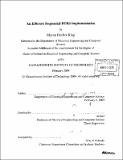An efficient sequential BTRS implementation
Author(s)
King, Myron Decker
DownloadFull printable version (2.831Mb)
Other Contributors
Massachusetts Institute of Technology. Dept. of Electrical Engineering and Computer Science.
Advisor
Arvind.
Terms of use
Metadata
Show full item recordAbstract
This thesis describes the implementation of BTRS, a language based on guarded atomic actions (GAA). The input language to the compiler which forms the basis of this work is a hierarchical tree of modules containing state, interface methods, and rules which fire atomically to cause state transitions. Since a schedule need not be specified, the program description is inherently nondeterministic, though the BTRS language does allow the programmer to remove nondeterminism by specifying varying degrees of scheduling constraints. The compiler outputs a (sequential) single-threaded C implementation of the input description, choosing a static schedule which adheres to the input constraints. The resulting work is intended to be used as the starting point for research into efficient software synthesis from guarded atomic actions, and ultimately a hardware inspired programming methodology for writing parallel software. This compiler is currently being used to generate software for a heterogeneous system in which the software and hardware components are both specified in BTRS.
Description
Thesis (S.M.)--Massachusetts Institute of Technology, Dept. of Electrical Engineering and Computer Science, 2009. Includes bibliographical references (leaves 73-74).
Date issued
2009Department
Massachusetts Institute of Technology. Department of Electrical Engineering and Computer SciencePublisher
Massachusetts Institute of Technology
Keywords
Electrical Engineering and Computer Science.